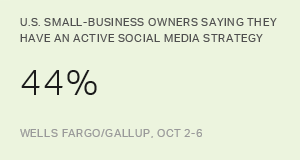PRINCETON, NJ -- U.S. small-business owners who aren't hiring -- 85% of those surveyed -- are most likely to say the reasons they are not doing so include not needing additional employees; worries about weak business conditions, including revenues; cash flow; and the overall U.S. economy. Additionally, nearly half of small-business owners point to potential healthcare costs (48%) and government regulations (46%) as reasons. One in four are not hiring because they worry they may not be in business in 12 months.
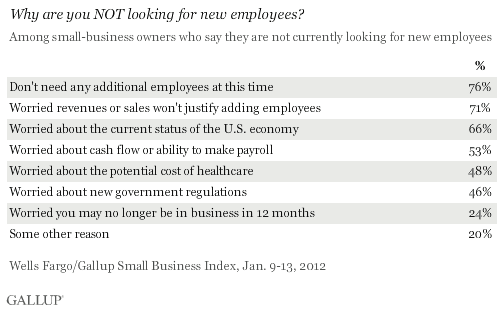
Companies typically hold back on hiring when the economy is weak and when their operating environment is not providing sufficient revenues or cash flows. This appears to be the case right now, as the economy has been weak for more than four years. Less typical is for many owners to point to such things as potential healthcare costs and government regulations.
Wells Fargo and Gallup survey 600 small-business owners quarterly to assess conditions within their companies as well as their outlook. Small-business owners' hiring intentions are currently the best they have been since January 2008, though the percentage who plan to hire new employees still represents a minority of small-business owners.
Better Business Conditions Encourage Hiring
Small-business owners who are currently hiring are most likely to say they are doing so because their business operations expanded, consumer or business demand increased, sales and revenues justify adding more employees, and they need to replace an employee who left. Thirteen percent of owners point to their ability to get new capital, while 7% indicate they were influenced by government tax incentives.
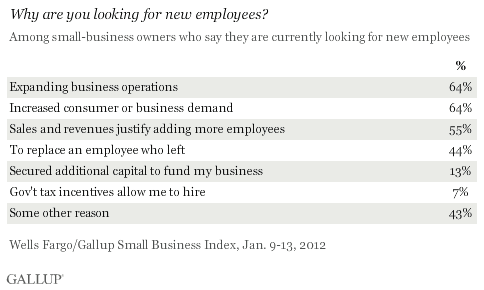
Hiring Mostly the Old-Fashioned Way
Small-business owners search for new employees most commonly through the old-fashioned ways of word-of-mouth (65% say it is a "major way" they find employees) and employee referrals (48%). One in five owners say the Internet is a major way -- up in recent years -- while 9% say the same about newspaper ads, down in recent years.
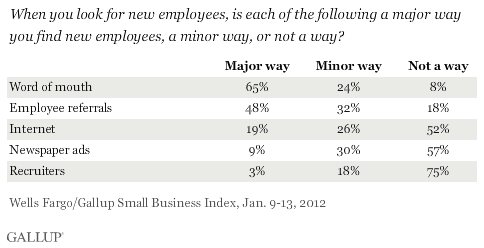
Hiring Fewer Employees Than Needed
One in three small-business owners who have hired employees in the last year say they have hired fewer employees than they need, while 65% have hired as many as they need. Five percent of owners report hiring more employees than they need. While this leaves a gap between small-business owners' perceived needs and their hiring during the last year, it is an improvement from November 2010, when 42% of owners said they had hired fewer employees than they needed.
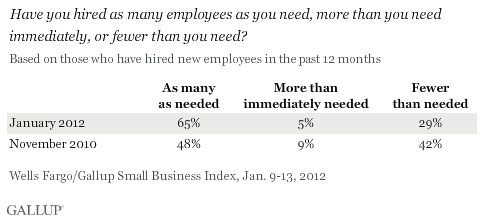
When small-business owners can't hire the new employees they need, they often turn to others for unpaid help. Most often, they seek the help of a spouse (21%) or help from their friends (16%) or children (15%). One in 10 get help from a relative who is not a spouse or a child, while 1 in 20 use an unpaid intern. Three in 10 say they don't turn to anyone.
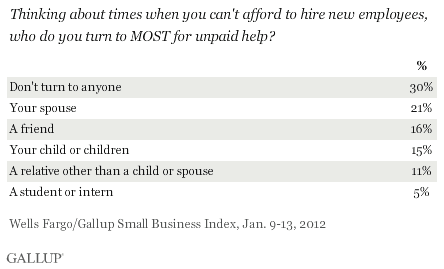
Implications
The debate over why U.S. small-business owners aren't hiring more aggressively tends to hinge on whether overall business conditions, including a lack of growth and revenue, are the primary culprit as opposed to the potential cost of healthcare and government regulations. Apparently, both sides of the debate are correct.
Small-business owners hire when they need to respond to increased business activity and have the opportunity to grow. Although some small businesses in selected industries and markets have been growing, the weak economy of the past four years has limited overall small-business growth. Further, many small businesses continue to feel financially vulnerable, with 66% saying they are worried about the current status of the U.S. economy and nearly one in four telling Gallup they fear they may not be in business 12 months from now.
Given this difficult operating environment, it is not surprising that many small-business owners also worry about potential new healthcare costs and government regulations. While small businesses are always finding ways to deal with their changing operating environment, including government regulations and healthcare, these added challenges can be seen as exacerbating an already uncertain and difficult situation. In turn, they become additional reasons to hold back on hiring.
Right now, economic confidence is approaching its highest levels in the last four years. U.S. small-business owners are also about as optimistic about their business and their future hiring as they've been at any point during that time. Congress can't do much in the immediate term to significantly improve small-business revenues and growth. However, lawmakers could place a moratorium on new regulations for some period of time. In turn, this might provide the extra push needed to get small-business owners to decide to hire the employees they actually need and get the economy growing at a pace the average American can recognize as an economic recovery.
About the Wells-Fargo Small Business Index
Since August 2003, the Wells Fargo/Gallup Small Business Index has surveyed small-business owners on current and future perceptions of their business financial situation.
Survey Methods
Results for the total dataset are based on telephone interviews with 600 small-business owners, conducted Jan. 9-13, 2012. For results based on the total sample of small-business owners, one can say with 95% confidence that the maximum margin of sampling error is ±4 percentage points.
Sampling is done on an RDD basis using Dun & Bradstreet sampling of small businesses having $20 million or less of sales or revenues. The data are weighted to be representative of U.S. small businesses within this size range nationwide.
In addition to sampling error, question wording and practical difficulties in conducting surveys can introduce error or bias into the findings of public opinion polls.
For more details on Gallup's polling methodology, visit www.gallup.com.
